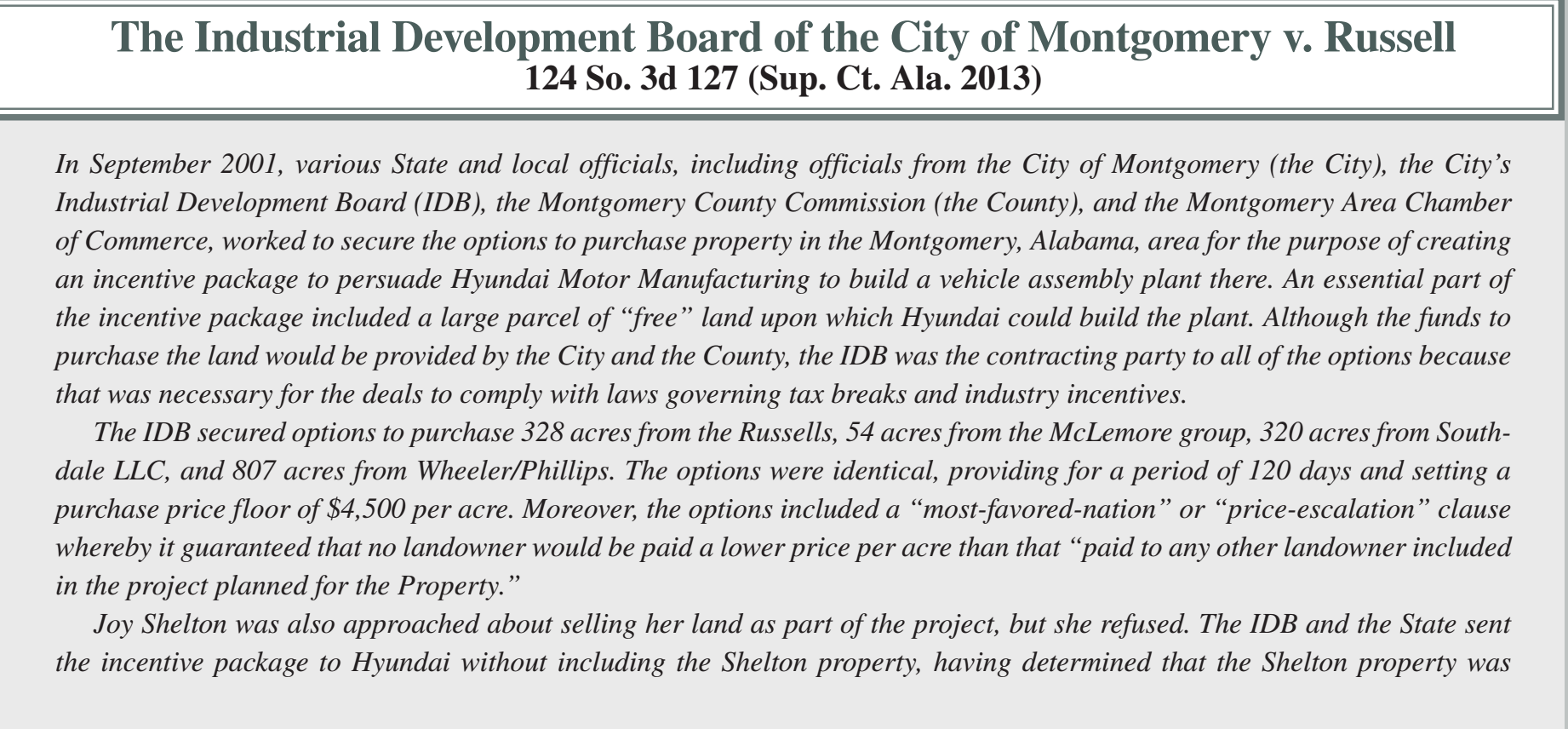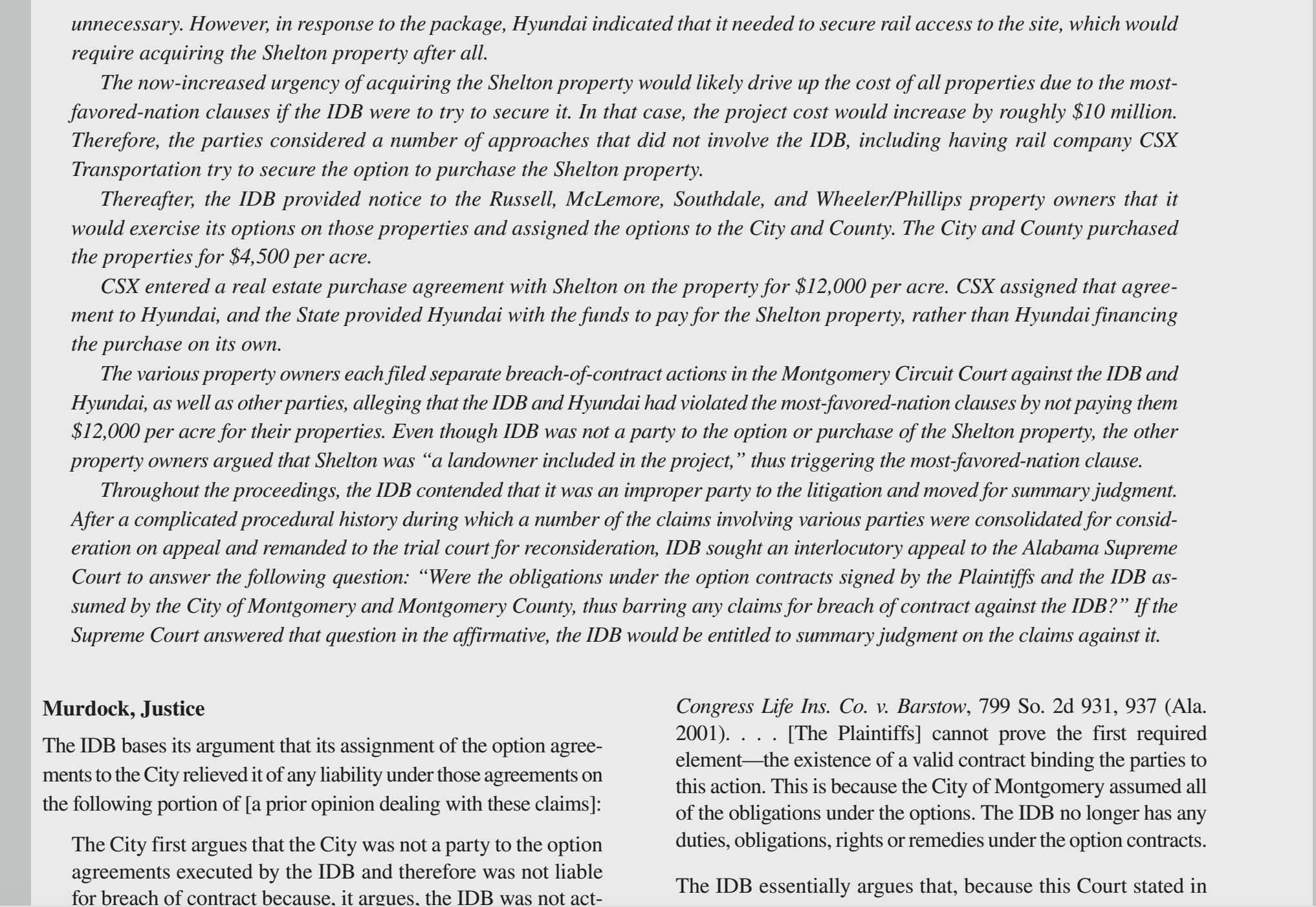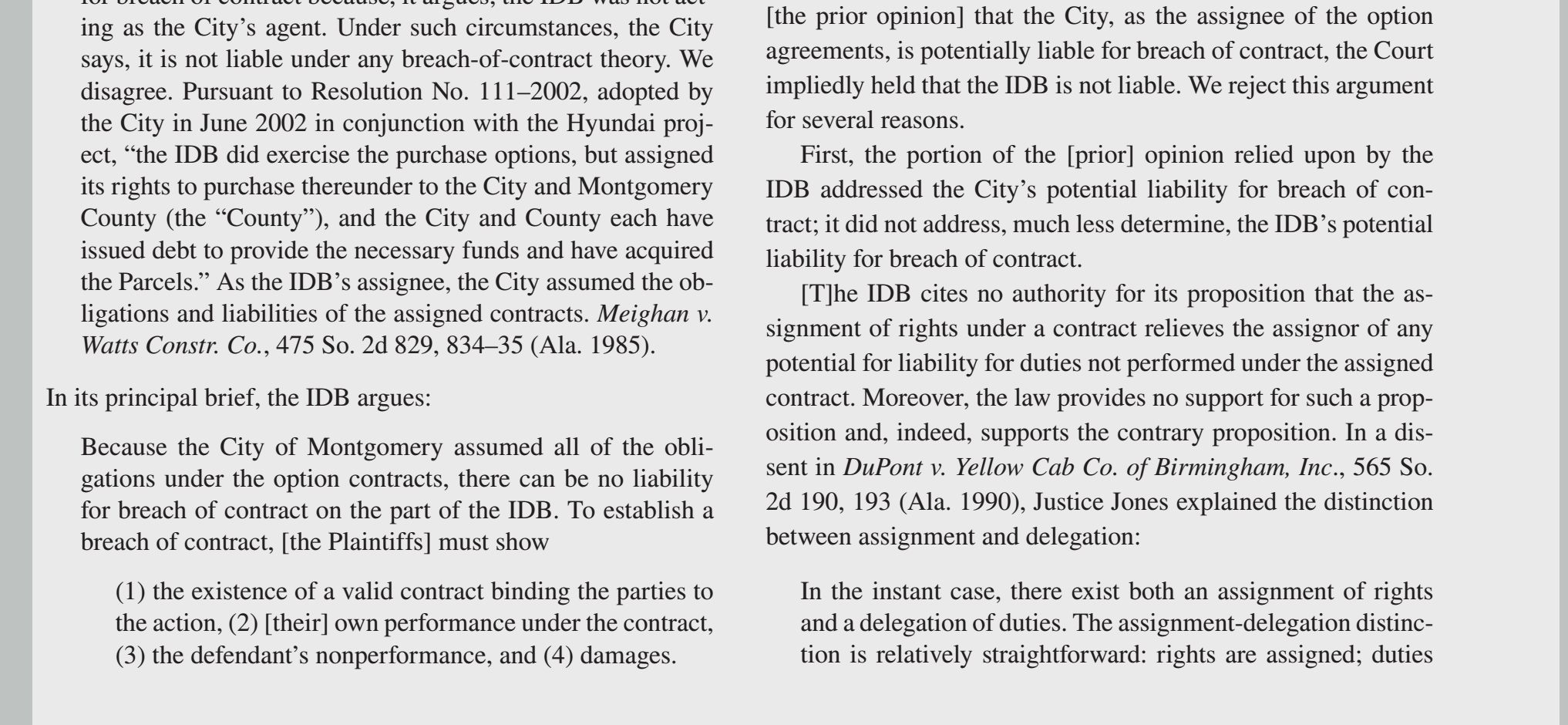



This is the case of The Industrial Development Board of the City of Montgomery v. Russell
the following;
Fact:
Judgment:
Issue:
Holding:
General Analysis
Applied Analysis:
The Industrial Development Board of the City of Montgomery v. Russell 124 So. 3d 127 (Sup. Ct. Ala. 2013) In September 2001, various State and local officials, including ofcials from the City of Montgomery (the City), the City's Industrial Development Board (IDB), the Montgomery County Commission (the County), and the Montgomery Area Chamber of Commerce, worked to secure the options to purchase property in the Montgomery, Alabama, area for the purpose of creating an incentive package to persuade Hyundai Motor Manufacturing to build a vehicle assembly plant there. An essential part of the incentive package included a large parcel of "free \" land upon which Hyundai could build the plant. Although the funds to purchase the land would be provided by the City and the County, the IDB was the contracting party to all of the options because that was necessary for the deals to comply with laws governing tax breaks and industry incentives. The IDB secured options to purchase 328 acres from the Russells, 54 acres from the McLemore group, 320 acres from South- dale LLC, and 807 acres from Wheeler/Phillips. The options were identical, providing for a period of 120 days and setting a purchase price oor of $4,500 per acre. Moreover, the options included a \"most-favorednation \" or "price-escalation\" clause whereby it guaranteed that no landowner would be paid a lower price per acre than that \"paid to any other landowner included in the project planned for the Property.\" Joy Shelton was also approached about selling her land as part of the project, but she refused. The IDB and the State sent the incentive package to Hyundai without including the Shelton property, having determined that the Shelton property was unnecessary. However, in response to the package, Hyundai indicated that it needed to secure rail access to the site, which would require acquiring the Shelton property after all. The now-increased urgency of acquiring the Shelton property would likely drive up the cost of all properties due to the most- favorednation clauses if the IDB were to try to secure it. In that case, the project cost would increase by roughly $10 million. Therefore, the parties considered a number of approaches that did not involve the IDB, including having rail company CSX Transportation try to secure the option to purchase the Shelton property. Thereafter; the IDB provided notice to the Russell, McLemore, Southdale, and Wheeler'hillips property owners that it would exercise its options on those properties and assigned the options to the City and County. The City and County purchased the properties for $4,500 per acre. CSX entered a real estate purchase agreement with Shelton on the property for $12,000 per acre' CSX assigned that agree- ment to Hyundai, and the State provided Hyundai with the funds to pay for the Shelton property, rather than Hyundai financing the purchase on its own. The various property owners each led separate breach-of-contract actions in the Montgomery Circuit Court against the IDB and Hyundai, as well as other parties, alleging that the IDB and Hyundai had violated the most-favorednation clauses by not paying them $12,000 per acre for their properties. Even though IDB was not a party to the option or purchase of the Shelton property, the other property owners argued that Shelton was \"a landowner included in the project, \" thus triggering the most-favorednation clause. Throughout the proceedings, the IDB contended that it was an improper party to the litigation and moved for summary judgment. After a complicated procedural history during which a number of the claims involving various parties were consolidated for consid- eration on appeal and remanded to the trial court for reconsideration, IDB sought an interlocutory appeal to the Alabama Supreme Court to answer the following question: \"Were the obligations under the option contracts signed by the Plaintis and the IDB as- sumed by the City of Montgomery and Montgomery County, thus barring any claims for breach of contract against the IDB? " If the Supreme Court answered that question in the airmative, the IDB would be entitled to summary judgment on the claims against it. Murdock, Justice The IDB bases its argument that its assignment of the option agree- ments to the City relieved it of any liability under those agreements on the following portion of [a prior opinion dealing with these claims]: The City rst argues that the City was not a party to the option agreements executed by the IDB and therefore was not liable for breach of contract because. it argues. the IDB was not act- Congress Life Ins. Co. v. Barstow, 799 So. 2d 931, 937 (Ala. 2001). . . . [The Plaintiffs] cannot prove the rst required elementthe existence of a valid contract binding the parties to this action. This is because the City of Montgomery assumed all of the obligations under the options. The lDB no longer has any duties, obligations, rights or remedies under the option contracts. The IDB essentially argues that, because this Court stated in ing as the City's agent. Under such circumstances, the City [the prior opinion] that the City, as the assignee of the option says, it is not liable under any breach-of-contract theory. We agreements, is potentially liable for breach of contract, the Court disagree. Pursuant to Resolution No. 111-2002, adopted by impliedly held that the IDB is not liable. We reject this argument the City in June 2002 in conjunction with the Hyundai proj- for several reasons. ect, "the IDB did exercise the purchase options, but assigned First, the portion of the [prior] opinion relied upon by the its rights to purchase thereunder to the City and Montgomery IDB addressed the City's potential liability for breach of con- County (the "County"), and the City and County each have tract; it did not address, much less determine, the IDB's potential issued debt to provide the necessary funds and have acquired liability for breach of contract. the Parcels." As the IDB's assignee, the City assumed the ob- [T]he IDB cites no authority for its proposition that the as- ligations and liabilities of the assigned contracts. Meighan v. Watts Constro., 475 So. 2d 829, 834-35 (Ala. 1985). signment of rights under a contract relieves the assignor of any potential for liability for duties not performed under the assigned In its principal brief, the IDB argues: contract. Moreover, the law provides no support for such a prop- Because the City of Montgomery assumed all of the obli- osition and, indeed, supports the contrary proposition. In a dis- gations under the option contracts, there can be no liability sent in DuPont v. Yellow Cab Co. of Birmingham, Inc., 565 So. for breach of contract on the part of the IDB. To establish a 2d 190, 193 (Ala. 1990), Justice Jones explained the distinction breach of contract, [the Plaintiffs] must show between assignment and delegation: (1) the existence of a valid contract binding the parties to In the instant case, there exist both an assignment of rights the action, (2) [their] own performance under the contract, and a delegation of duties. The assignment-delegation distinc (3) the defendant's nonperformance, and (4) damages. tion is relatively straightforward: rights are assigned; dutiesare delegated. When a party to a contract transfers his rights the IDB to relieve itself of contractual liability by way of such a under the contract to a third party, he has made an assignment. delegation or (2) that the parties had entered into novations pur- If a party to the contract appoints a third party to render per- suant to which [the Plaintiffs] agreed that the IDB's obligations formance under the contract, he has made a delegation. Gen- had changed. See generally, e.g., Marvin's, Inc. v. Robertson, erally speaking, upon assignment of a right, the assignor's 608 So. 2d 391, 393 (Ala. 1992) (explaining that "'[a] nova- interest in that right is extinguished; however, upon the del- tion is the substitution of one contract for another, which ex- egation of a contractual duty, the delegating party remains lia- ble under the contract, unless the contract provides otherwise tinguishes the pre-existing obligation and releases those bound or there is a novation. Calamari and Perillo's Hornbook on thereunder. .. . In addition, the party alleging a novation has the Contracts, $ 18-25 (3d ed. 1987). Professor Knapp analogizes burden of proving that such was the intention of the parties.'" the assignment-delegation distinction thusly: "If assigning a (quoting Pilalas v. Baldwin County Sav. & Loan Ass'n, 549 So. right is like passing a football, then delegating a duty resem- 2d 92, 94-95 (Ala. 1989) (emphasis omitted))). The IDB does bles more the dissemination of a catchy tune or a communi- not assert or demonstrate either condition. Accordingly, the trial cable disease: Passing it on is not the same as getting rid of court's denial of the IDB's motion for a summary judgment is it." C. Knapp, Problems in Contract Law 1161 (1976). not due to be reversed on this ground. (Footnote omitted.) See also Restatement (Second) of Contracts $ 318 (1981). Conclusion [The IDB assigned to the City and the County its rights The trial court's order denying the IDB's motion for a summary under the option agreements. Assuming that this assignment of judgment, in which the trial court rejected the IDB's arguments rights carried with it a delegation of the duties owed by the IDB that the IDB should be relieved from liability based on its as- under the agreements, the IDB nonetheless also would have had signment of [its] rights under the option agreements . . . is due to demonstrate either (1) that the terms of the contracts allowed to be affirmed














